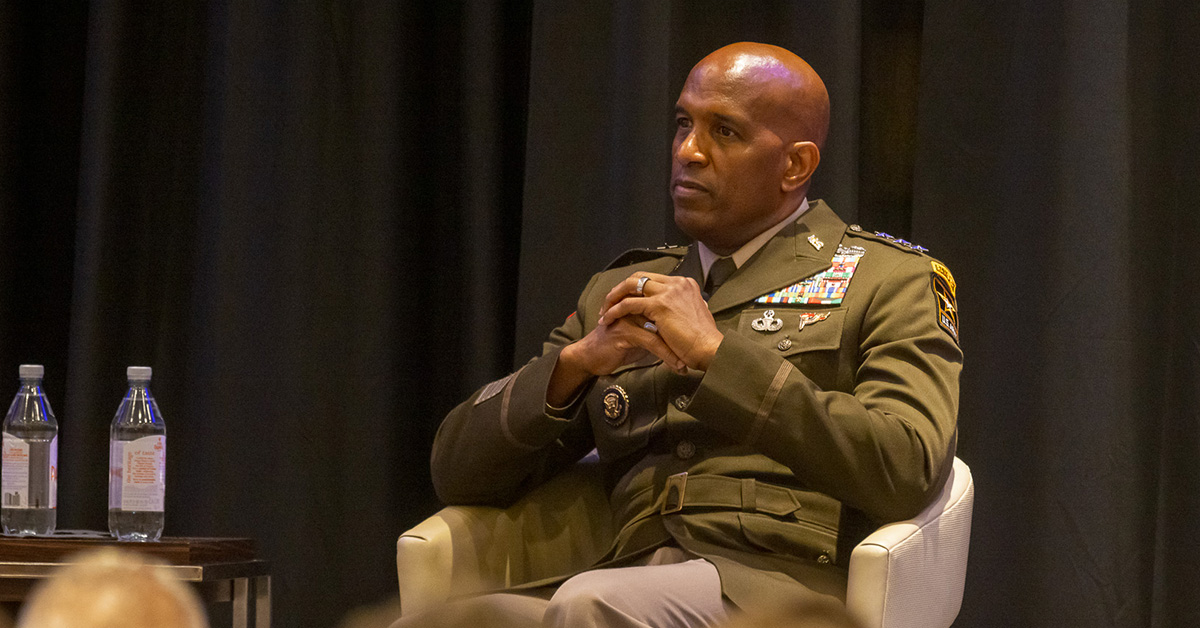
Lt. Gen. Jeth Rey takes questions from the GovCon audience at the 2025 Army Summit. Photo: Charles McClanahan
Jeth Rey Shares What’s Next for Army Cyber Strategy After Zero Trust
While many are pointing to a brewing future conflict as happening overseas—especially in or near the Indo-Pacific region—a top U.S. Army lieutenant general and technology official believes it’s occurring right here at home instead, “lurking in our networks.”
“Our cyber warriors are now the frontline force … Networks are targeted before the first kinetic strike is done. Cyber is the first strikedown,” stated Lt. Gen. Jeth Rey, deputy chief of staff G-6 for the Army, during a keynote address at the Potomac Officers Club’s 2025 Army Summit on Wednesday.
“Drones are showing up everywhere on the battlefield. How will we counter those? Sensors saturating the battlefield. How will we catch the information, make sense of it and produce that data for our commanders to make informed decisions?” he posited.
Despite this portrait of the battlefield as electronically focused, with commercial tech “everywhere,” Lt. Gen. Rey nonetheless also stressed the importance of human personnel in meeting these challenges.
To learn about how the Navy is readying its force for the cyber fight and electronic warfare, be sure to attend POC’s 2025 Navy Summit on August 26. Hear from powerful Navy decision-makers like Chief Information Officer Jane Rathbun, Chief Technology Officer Justin Fanelli and Chief Data and AI Officer Stuart Wagner. Register for this pivotal GovCon conference now.
How Army Will Win the Cyber Fight
“Technology alone won’t win the fight. People will,” Rey issued, adding, “Our soldiers, civilians and IT cyber professionals are the heart of transformation to build that force that is data-centric, cyber capable and combat-ready.”
The Army’s technologically advanced, people-centric strategy has two main thrusts.
Talent Incubation
Rey believes that effective warfighters must be shaped via shrewd recruitment, “tough, realistic” training and then an investment in soldiers’ quality of life that results in them sticking around and serving for many years. This means reducing administrative stress and fostering mentorship, Rey said.
In the same breath, though, the DCS G-6 said that due to the digital demands of the global battlefield today, a significant part of the training will involve hardware like drones and tactics such as jamming.
Bold Innovation
Pushing against the expected and the tried-and-true and finding new ways to do things is the other wrung in the Army’s path to cyber readiness. Rey said that every day, his boss, CIO and Wash100 Award winner Leonel Garciga—who was in the room and who joined Rey in answering his questions during his Q&A—challenges the status quo. This, in turn, motivates Rey to do the same and rethink norms.
“We are continuing to ‘transform in contact,’ champion bottom-up innovation and soldier-centered design. This is a workforce optimization in action and it has and we will cultivate agility, mission-grade teams that our Army and our joint force will lead in the future,” Rey said.

Army Cyber Strategy Beyond Zero Trust & 2027
There is a clear goal for all systems to be zero-trust-compliant by 2027 across the Department of Defense. But Rey said this task is still “a pain in our side right now to get there across all of our services.” They’ve had no trouble, however, with achieving data centricity goals like transport diversity and data and cloud enablement.
The 2025 Navy Summit will feature a panel discussion amongst industry-leading experts about zero trust and what lies beyond it for the sea service branch. Don’t miss this important conversation; save your spot for the Aug. 26 GovCon event today!
“What we’re not doing well is ensuring that our data is tag-labeled in a way that we can get accurate by using attribute-based access control. So that’s why it’s very tough to achieve the zero trust and identity credential management goals, but we’re working towards it and I think we’re going to achieve it,” Rey told Potomac Officers Club.
Quantum
A new target is emerging. After the zero trust goal is complete, achieving quantum resistance or quantum encryption will be a top priority, according to the lieutenant general.
A Message for Industry
Lt. Gen. Rey concluded his remarks with a direct request for the contractor-heavy audience. He asked that they design their products with soldiers—and the Army and joint force’s IT requirements—in mind and instructed them to “integrate disruptive [commercial-off-the-shelf] solutions every time.” Industry members were encouraged to embrace the as-a-service model for everything from cloud products to satellites.
“Together, we can ensure overwhelming superiority in the battlespace of tomorrow,” he resolved.

Category: Articles





